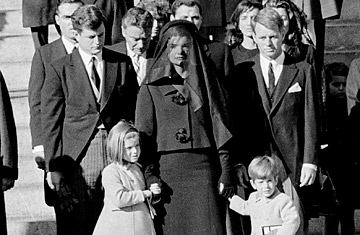
The Kennedy family stands outside St. Matthew's Cathedral after President John F. Kennedy's funeral on Nov. 25, 1963
(2 of 2)
At Arlington, the pallbearers gave Jackie the flag from the coffin, which she embraced as if it were a small child. Then she took a taper and lit the flame at the foot of the grave — an "eternal light." Bobby and Teddy Kennedy touched taper to flame too. Then they turned to go, and the funeral was over.
Or at least, the public part was. Through it all, behind the sad pageantry, a quieter remembrance was under way. The night before the funeral, his closest friends held an improvised wake; Teddy led them in singing "When Irish Eyes Are Smiling." The next day, as he walked with Jackie and Bobby behind the casket, Teddy wore the trousers Jack had worn for his Inauguration and a pair of his gloves. This was how it went: the younger brother quite literally assuming, if not his brother's role, then at least his costume. And late that night, long after the burial, Jackie and Bobby returned to Arlington. She put a small bouquet of lilies on the grave, prayed, wept and went away. A week later, the bodies of her two babies who had died at birth were moved to lie near their father.
John F. Kennedy's funeral was one of those events that shoved history around a corner. That was the day the '50s became the '60s, that new generation bearing its torch now using it to set fires. By the time of Bobby Kennedy's assassination in the early hours of June 5, 1968, the dreamy promise of Camelot seemed like a mirage. The City on a Hill was burning down, American power and goodness both turning to ashes in Vietnam. In New York the murder rate jumped 21% in 1968 alone; and then murder swept away first Martin Luther King and then Bobby, who had become, in the words of New York psychiatrist Frederic Wertham, a natural target for "magnicide — the killing of somebody big."
This time the task of leading the country through yet another ritual of grief fell to Ted Kennedy. First he had to tend his family, shuttling between his stricken parents in Hyannis Port and Bobby's widow Ethel and 10 children in Virginia. He and his mother Rose taped a five-minute television message of thanks to the nation for its condolences. By 1968 she had lost four of her nine children — and here, the Kennedy way of death was given its clearest expression: "We shall honor him not with useless mourning and vain regrets for the past," Rose Kennedy said, "but with firm and indomitable resolutions for the future: acting now to relieve the starvation of people in this country, working now to aid the disadvantaged and those helpless, inarticulate masses for whom he felt so deeply and for whom he worked long hours, night as well as day."
Eight of the Kennedy children carried the bread and wine for the Communion at the funeral Mass at St. Patrick's Cathedral in New York City. Ethel made certain the priests wore purple, the color of hope, rather than black. She wanted the Mass to be joyful. Ted stayed up all night writing his eulogy; his voice broke only at the end, as he brought his brother down to earth and then made him larger than life. "My brother need not be idealized, or enlarged in death beyond what he was in life," he said, "to be remembered simply as a good and decent man, who saw wrong and tried to right it, saw suffering and tried to heal it, saw war and tried to stop it."
But then he quoted his brother's message, to all those he had sought to lead: "Some men see things as they are and say why. I dream things that never were and say why not." Then a funeral train carried his body to Washington; inside was a traveling Irish wake, with family and friends assuring one another that life goes on, telling stories, singing, laughing. Outside, the tracks and fields and sidewalks were lined with many thousands of people waiting to say goodbye. It was dark by the time the assembly reached Arlington; the pallbearers seemed lost, unsure where to go. Arthur Schlesinger described the scene of Ambassador-at-Large Averill Harriman asking Kennedy brother-in-law and campaign manager Steve Smith if he knew where they were going. "Well, I'm not sure," Smith said. But "I distinctly heard a voice coming out of the coffin saying, 'Damn it. If you fellows put me down, I'll show you the way.' "
Now Ted Kennedy is gone as well. Tens of thousands of people lined the highway between Hyannis Port and Boston as his body was moved to his brother's library to lie in state, where many thousands more waited to pay respects. There will be another funeral, this one with four Presidents in attendance. His body will lie beside his brothers' at Arlington. His followers will fight to keep his dream alive.
And once again, his family will have to find the space to grieve in private as well as public.
Download the new TIME BlackBerry app at app.time.com.
